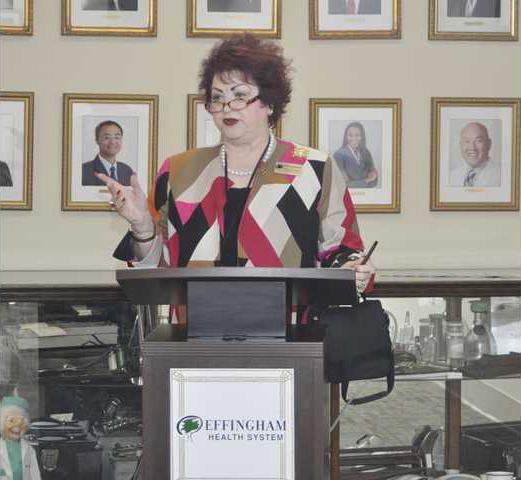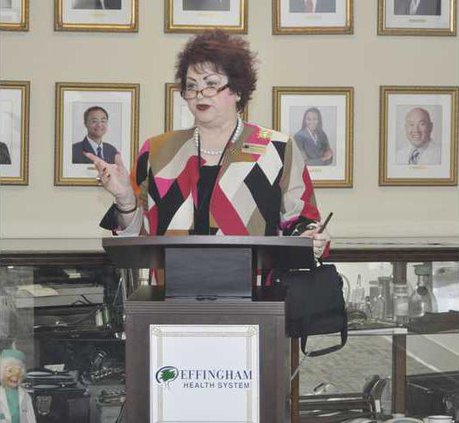The Effingham Health System is set to embark on another set of changes for how it delivers health care.
The Effingham Hospital is working on adding oncology and chemotherapy services, renovating a portion of the old hospital in order to administer chemo to up to seven patients at a time.
“For a long time, hospital authority members have been discussing with me the opportunity to bring chemotherapy here,” Effingham Health System CEO Norma Jean Morgan said. “Chemo is on the horizon.”
Morgan said the hospital is planning on providing chemo to patients by the end of the year. Also, the hospital may turn its operation into a non-profit 501c3 corporation. The hospital authority had explored the idea back in 2009 but abandoned it for the modernization project completed four years ago.
“This is another exciting time for us,” said Effingham Hospital Authority chairman Rick Rafter. “It’s going to give us an opportunity to expand the capabilities and the service to the community around us, and not just the Effingham community.”
Morgan delivered an update on the hospital’s progress and outlook Tuesday afternoon, and the hospital is in strong shape, she said.
“We have more small hospitals in our state that are closed or are closing,” Morgan said, “and we consider ourselves very blessed that our organization is not in that position.”
The nonprofit corporation board will be identical to the current hospital authority, hospital attorney Rusty Ross said, and any changes on the authority will be reflected on the board.
“There is not going to be a change in membership,” he said.
The hospital can be leased for up to 40 years to the nonprofit board created, and the 501c3 will assume the hospital’s liabilities. Ross said Effingham Hospital is one of the last facilities of its size in Georgia to pursue this route.
“We must embrace transformation,” Morgan said. “We are definitely a different organization as we move forward. We have different mission, different vision, principles are different. We are blessed that we are an organization that is surviving and growing.”
A public hearing will be held in early July, and the target date for the transition to the nonprofit corporation model is Oct.1.
One of the changes will be preventing and managing illnesses and ailments over admitting patients into the hospital.
“It’s not just a matter of taking care of sick people,” Morgan said. “We will be asked to manage a population and work toward keeping them out of the hospital rather than encouraging them to be in the hospital.”
The new nonprofit corporation also will enable the hospital to extend services beyond Effingham’s county line, perhaps into Pooler. Morgan said the hospital already draws from Screven and Bulloch counties and from South Carolina for its services.
“Our service area is far beyond our borders,” she said.
The Effingham Health System also is starting Effingham Cares, a health benefit “for the community so people can be served at the least cost to them and the highest level we can offer through care coordination,” Morgan said, as its shifts toward population care. Effingham Cares will be a “locally-directed yet competitively-priced network.”
“We have embraced a new mission for the hospital authority,” Morgan said. “Because we are transforming and becoming a new organization, we have revisited our mission, vision and values. Beginning July 1 our mission is to provide every patient an experience of compassion, quality care and service excellence at its highest level of customer expectation.”
Effingham Hospital also is one of two hospitals in Georgia to become a National Rural Accountable Care Organization. Morgan also applauded state lawmakers for their efforts to help rural hospitals through recent legislation. SB 258 allows Georgia taxpayers to receive tax credits for donations to hospitals and health care organizations.
“It gives an opportunity for rural counties to help themselves,” said state Rep. Jon Burns, the House majority leader. “We felt it was that much of a lifeline in trying to create alternative ways to support rural health care. As we look at rural health care in Georgia, everyone is not as fortunate as we are in Effingham County.”
EHS Chief Financial Officer Michael Scribner said the hospital has grown over the last several years. Its revenues were between $8 million and $9 million in fiscal year 2007 and now approach $30 million.
Visits to the emergency room have gone from 12,000 to 16,000 a year, and surgical cases have nearly doubled from 800 three years ago. The women’s health initiative also has blossomed since its opening, he said.
“By almost every measurement, this hospital has grown a lot in the last several years,” Scribner said. “We’re very blessed to be in the situation we are.”
A Georgia Hospital Association study reported the hospital’s impact at more than $67 million for the local and state economies and it created 984 full-time jobs.
“We believe it’s our job to have an economic impact on the community,” Scribner said. “We don’t believe it’s just our job to drive business into this hospital. We believe it’s our job to be a leverageable asset for this community. We believe we have a role we should play in growing the economic engine of this community. We believe we are attempting to do that. We have a lot to learn in doing that.”
There are challenges today and ahead, Scribner cautioned. EHS officials don’t know what will transpire from Memorial Health University Center’s partnership with Novent. Telemedicine is both an opportunity and a threat, Scribner said, insurance costs are rising and it remains difficult to recruit physicians to rural areas. The hospital, through nine months of the current fiscal year, has delivered $10 million worth of uncompensated care. And while the number of those without insurance remains high, a growing segment is those who are under-insured, Scribner said.
“We’re in a very challenging market,” he said. “Our business model has to change. There are new things we have to learn.”
The hospital has to develop the ability to identify the people whose high costs of care can be prevented or better manage what their costs are going to be, Scribner added.
“We’re not naïve to the fact we’re in a difficult environment from a federal and state perspective,” he said. “Health care is not sustainable. The cost of health care is not sustainable. We understand that.”
Population care consists of primary prevention, directing people who show up at the emergency room for treatment who should be seeing a primary care physician, condition management and care management.
“Our business model has to change,” Scribner said. “If we’re going to be an effective primary care resource for this community, this is where we have to go. This is the footprint of successful future version of primary care small hospitals in the future. We’re less than a fourth of the cost of health care incurred in this county. But we believe we can quarterback three-fourths of the cost.”
The hospital will continue to recruit physicians, and Morgan said the area north of Highway 275 is classified as under-served by doctors.
“We are always looking to bring in more physicians,” she said. “We want to expand our primary care.”
The hospital has added PET scans, an orthopaedic suite and the Care Center was one of our nationally and the only in Georgia awarded the Baldrige Award in 2015.
“We think we’re the best-kept secret around,” Scribner said. “We believe that our patient satisfaction and quality of care are at least as good as what you can get in Savannah. Period.”








